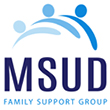Participation in the MSUD Family Support Group Registry
The MSUD Family Support Group Registry is a patient-driven registry that allows people who are impacted by MSUD to share their health data and experience living with the condition. This research initiative has been identified by the MSUD Scientific Advisory Board as the #1 priority for the MSUD community. The MSUD Registry collects information on diagnosis, management, treatment practices, barriers to care, and quality of life, creating a roadmap for researchers in their quest to better understand the needs of our community and to develop new treatments and potential cures for this disease.
In this short video, Jordann Coleman, a member of the MSUD Family Support Group Board Of Directors describes the registry and its importance to our community.
Your participation in the Registry will
- Help fill in gaps in our knowledge related to the long-term health and quality of life of individuals with MSUD.
- Identify areas for future research aimed at the successful treatment of MSUD.
- Help doctors understand the unmet needs of those with MSUD.
- Facilitate the development of new treatments for MSUD by providing a natural history to support clinical trials.
- Guide the development of standards of treatment for those with MSUD.
This information is gathered through online surveys which can be completed at your own pace. If you prefer, written surveys can be mailed to you. Your information remains private and is not linked to your name or other identifiers.
You will be asked to update your information annually.
In this interview Dr. Karen Dolins, Research Lead and Secretary of the MSUD Family Support Group Board of Directors, discusses MSUD, its impact on her family’s life and how the registry will enable the MSUD research effort to move forward.
You can participate in the registry by enrolling and completing the registry questionnaire on-line. You can also download a paper copy, fill it out and mail it to CoRDS. To begin the on-line enrollment process to participate in the MSUD Family Support Group registry, click on this button:
After completing the above registration process, you can enter the MSUD registry and enter or edit your data by clicking on this button:
If you prefer to review the MSUD registry questionnaire in advance or complete a paper copy of the registry and mail it to CoRDS, then click here:
Hard copies and Spanish language copies of the questionnaire can be obtained by emailing cords@sanfordhealth.org or calling CoRDS at 877-658-9192.
The MSUD Family Support Group Registry
What We Have Learned From You
Have you participated in the MSUD Registry with Sanford CoRDS yet? If you are one of the 145 people who did, thank you! Here’s what we have learned so far from 117 responses:
- 87% of respondents have Classic MSUD
- 55% have been hospitalized 5 times or more
- 13% are seen by their metabolic team monthly or quarterly; 73% are seen semi-annually or annually
- 53% receive the results of routine blood tests within 48 hours
- 24% report having received a diagnosis of an anxiety disorder
- 41% report strict compliance with diet
- 23% report out of pocket expenses related to MSUD of more than $2500 annually
- 14% report receiving individual assistance at school
- 32% of adults report living with their parents
